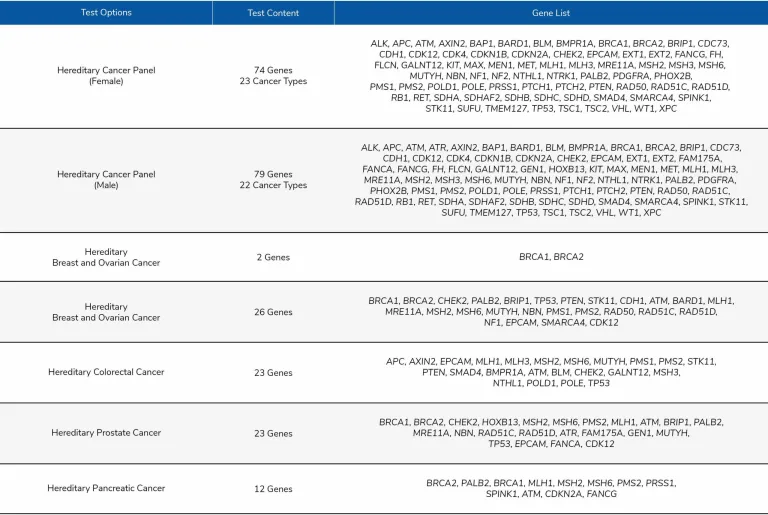Sentis Hereditary panels: a milestone in hereditary cancer prevention

The battle against cancer is increasingly fought with the weapons of precision medicine, where genetic testing plays a key role. Comprehensive genetic screening panels Sentis Hereditary from the genetic laboratory Ginekaliks are proof of this trend, offering a sophisticated approach for understanding hereditary cancer predispositions. During < b>Cancer Prevention Action Week 2024(19–25.02), such innovative solutions become even more relevant.
Role of genetics in cancer risk assessment
Cancer is a complex disease with multifaceted causes, among which genetics appears as a key player. Sentis Hereditary panels reflect a comprehensive approach to mapping hereditary factors that contribute to cancer risk. It is a proactive step towards personalized health care, enabling preventive and targeted interventions.
The Sentis Hereditary Genetic Compendium
Sentis Hereditary panels offer a robust suite of genetic testing tailored for both female and male patients. For women, 74 genes associated with 23 types of cancer are closely examined, covering a wide range of genetic markers from ALK to XPC. This extensive list of genes includes critical markers for breast cancer (BRCA1, BRCA2), melanoma (CDKN2A), and Lynch syndrome (MLH1, MSH2, MSH6), among others.
- For men, the panel covers 79 genes associated with 22 types of cancer, providing a complete genetic assessment for conditions such as prostate cancer (BRCA1, BRCA2, HOXB13) and pancreatic cancer (BRCA2, PALB2).
- In addition, more narrowly focused trials for hereditary breast and ovarian cancer are available, examining BRCA1 and BRCA2 in a 2-gene test and expanding to a 26-gene panel for a more comprehensive review.
- A separate panel of 23 genes addresses hereditary colorectal cancer, examining genes such as APC and EPCAM, while the same number of genes is examined for hereditary prostate cancer, highlighting the importance of BRCA1, BRCA2 and CHEK2.
- For hereditary pancreatic cancer, a panel of 12 genes, including BRCA1, BRCA2 and CDKN2A, offers targeted genetic insights.
Each gene has been carefully selected for its well-established role in cancer risk, providing healthcare professionals with a detailed genetic blueprint to effectively guide patient management strategies and preventive care.

Clinical application in practice
Findings from Sentis Hereditary panels are instrumental in shaping patient care. For people with a significant family history of cancer, panels can guide preventive measures, define control strategies, and even influence treatment decisions. Healthcare professionals can use the insights provided by Sentis Hereditary panels to offer personalized advice, making them valuable for clinical practice.
Integration in cancer prevention strategies
Incorporating genetic testing into cancer prevention strategies improves the ability to identify high-risk individuals. The Sentis Hereditary panels, with their comprehensive gene coverage, offer robust tools for such stratification. They encourage a shift from a one-size-fits-all approach to a personalized, individualized prevention plan.
Ethical considerations and genetic counseling
The advent of genetic testing brings ethical considerations to the fore, emphasizing the need for informed consent and genetic counseling. Sentis Hereditary panels emphasize the importance of providing patients with a clear understanding of the implications of genetic testing results.
The Gynecalyx Genetics Laboratory's Sentis Hereditary Comprehensive Cancer Panels are a significant contribution to the field of oncology. They demonstrate the potential of genetic testing to not only improve patient outcomes through targeted prevention, but also to empower individuals with insights into their genetic health. As we mark Cancer Prevention Action Week 2024 (February 19–25), it's clear that the future of cancer prevention will be deeply intertwined with advances in genetic testing.
Frequently asked questions
- What is genetic testing for hereditary cancer?
Genetic testing for hereditary cancer is a medical screening process used to identify inherited gene mutations that increase the risk of certain types of cancer. This form of testing is crucial for people with a family history of cancer, as it can reveal genetic predispositions and help take proactive steps toward cancer prevention or early (timely) detection. - How do Sentis Hereditary panels help in cancer prevention?
Sentis Hereditary panels help in cancer prevention by providing a comprehensive analysis of genes known to be associated with an increased risk of developing hereditary cancers . By identifying these genetic mutations early, healthcare providers can implement personalized control and prevention strategies, such as more frequent examinations, lifestyle changes and preventive medical interventions. - Which genes are analyzed by Sentis Hereditary Comprehensive Cancer Panels?
Sentis Hereditary Comprehensive Cancer Panels analyze a wide range of genes associated with hereditary cancer. For women, for example, 74 genes associated with 23 types of cancer are examined, while for men, 79 genes associated with 22 types of cancer are included. The panels include genes responsible for common cancers, such as BRCA1 and BRCA2 for breast and ovarian cancer, but also genes involved in rarer but equally significant hereditary cancer syndromes, such as MLH1, MSH2 and MSH6 for Lynch syndrome. - What role does genetic counseling play in the interpretation of results?
Genetic counseling is a vital component of the genetic testing process. It involves communicating with a trained professional who can interpret the results of the Sentis Hereditary panels and discuss their implications. Genetic counselors provide education about the potential risks, benefits, and limitations of testing. They also offer emotional support and help individuals and families understand their cancer risk, discuss management options, and make informed decisions about their health care.
Tags/Keywords: hereditary cancer, genetic testing, cancer prevention, precision medicine, innovation in oncology, BRCA1, BRCA2, personalized healthcare, Gynecalyx genetics laboratory, cancer risk assessment
